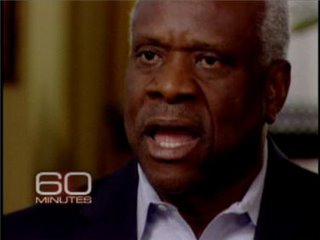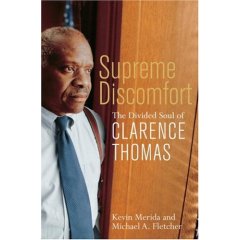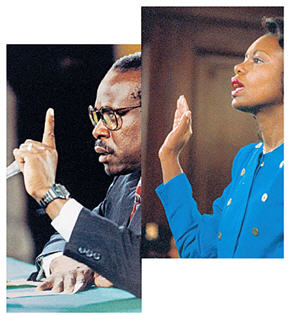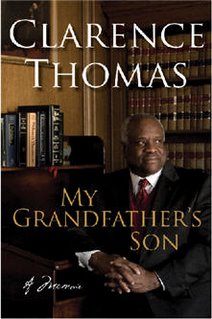The career of most Supreme Court justices is distinguished by the precedent-setting decisions they write. But that of Justice Clarence Thomas will undoubtedly be distinguished by the dark, silent (Zombie-like) shadow he casts over the court’s proceedings.
Truth be told, however, no one could have expected Thomas to excel as a jurist; not even George H. Bush, the president who nominated him. Although, by the same token, no one could have imagined Thomas would serve as little more than a judicial eunuch; not even his most partisan critics.
After all, when Bush insisted in 1991 that the then 43-year old Thomas was the “best qualified man for the job [and that] race was not a factor in his nomination”, he must have known, as surely as every legal (and political) pundit knew, that those words would seal his fate as the biggest liar in the history of the presidency since Richard Nixon insisted “I am not a crook”. Although, notwithstanding their crude caricatures of him, Thomas’s critics must have known that he was no dumb “Uncle Tom”.
(Incidentally, Supreme Court analysts invariably insinuate that Thomas’s failure, or refusal, to join fellow justices in challenging lawyers’ arguments in open court stems from his paralyzing inferiority complex. He maintains, however, that it merely reflects the quiet confidence and laid-back style of his ponderous intellect….)
 No matter his credentials or performance, however, Thomas’s professional legacy was sealed even before he assumed his seat on the Court. Because as much as he’s bound to earn the merit of honor for most dubious service, he is also destined to be remembered for having the most scandalous, if not pornographic, confirmation hearing in the history of Supreme Court nominations; which brings me to his appearance on last night’s edition of 60 Minutes.
No matter his credentials or performance, however, Thomas’s professional legacy was sealed even before he assumed his seat on the Court. Because as much as he’s bound to earn the merit of honor for most dubious service, he is also destined to be remembered for having the most scandalous, if not pornographic, confirmation hearing in the history of Supreme Court nominations; which brings me to his appearance on last night’s edition of 60 Minutes.
Thomas finally agreed to speak publicly about his contentious hearings to promote his autobiography entitled My Grandfather’s Son. And, no doubt, he’s hoping against hope that this book will cleanse the stain those hearings left on his career and, evidently, his conscience.
Its publication was scheduled for today to coincide with the annual start of the court’s new term, which is always on the first Monday in October. But, given his wholly-assailable record on the court, it’s not at all surprising that Thomas’s autobiography ends where his tenure began; i.e., with his swearing in 16 years ago.
Likewise, however, it is not at all surprising that much of the book – and certainly the part that will generate most public interest (sales) – deals with his confirmation; specifically, the eleventh-hour charges of sexual harassment that his former employee, Anita Hill, filed against him. Never mind the fact that Thomas chronicles a truly compelling life story, which details his rise from abject poverty in rural Georgia – where he was abandoned by his father when he was only two-years old.
 It must be noted, however, that there’s nothing unique about Thomas’s life in black America. Moreover, to the extent his life story is worth reading about, the biography by Kevin Merida and Michael Fletcher entitled Supreme Discomfort: The Divided Soul of Clarence Thomas is a far more thorough and insightful read. And not least because they document the social insecurities, personal resentments (especially against light-skinned blacks) and political grudges that still seem to beset his life.
It must be noted, however, that there’s nothing unique about Thomas’s life in black America. Moreover, to the extent his life story is worth reading about, the biography by Kevin Merida and Michael Fletcher entitled Supreme Discomfort: The Divided Soul of Clarence Thomas is a far more thorough and insightful read. And not least because they document the social insecurities, personal resentments (especially against light-skinned blacks) and political grudges that still seem to beset his life.
At any rate, Thomas confirmed during his 60 Minutes interview, in words and demeanor, what many reviewers have highlighted about his memoir: Namely, that it is primarily a “seething” and “embittered” rehashing of the unseemly political fight that attended his confirmation.
Perhaps you recall how Hill and her opportunistic avengers did their best to cast her as a victim of sexual harassment (no matter how retarded – in time and substance – her claims about his crude references to pubic hairs on coke cans were). And, in turn, how Thomas and his equally opportunistic defenders did their best to cast him as a political martyr (with Thomas playing the race card complete with a patently-affected allusion to a “high-tech lynching”).
(Incidentally, that Thomas was allowed to reiterate self-righteous denials about Hill’s charges, without having to explain corroborating evidence about his “sexual misconduct”, betrays the fact that last night’s interview was little more than a belated media valentine. Especially since evidence of his lies and hypocrisy in this regard was delineated so convincingly in the bestselling book, Strange Justice, by Jane Mayer and Jill Abramson. In fact, given the publishing precedent set by his fellow pariah, O.J. Simpson, perhaps Thomas should have titled his book If I harassed her….)
 Nevertheless, no one can deny that both Thomas and Hill were merely used by their respective patrons to further craven political agendas. And, to his credit, Thomas gets it:
Nevertheless, no one can deny that both Thomas and Hill were merely used by their respective patrons to further craven political agendas. And, to his credit, Thomas gets it:
The process harmed her. It harmed me and we see sort of the precedent of this kind of thing begin to harm even people like President Clinton. Things are out of control. That’s not good for the country. It’s not good for the court. What are we going to look like years from now if we can’t get people confirmed because everybody gets to attack them. They get to draw and quarter them.
But that’s all he seems to get. Because in this same interview, Thomas insisted that abortion was the real issue at his confirmation: Namely, “the elephant in the room…that people are apparently so upset about”. Whereas, in fact, Thomas himself was the issue that most people (especially blacks) were upset about.
After all, he continually vents hostility towards federal laws and programs (most notably affirmative action policies) that were intended to help minorities. This is why so many people feared he would do his best to undermine them. Never mind the galling fact that, by all objective criteria, Thomas was the most famous beneficiary of these laws and programs. And this, notwithstanding his dogmatic efforts to mask self-denial about these benefits by espousing the 19th Century self-help, black-empowerment philosophy of Booker T. Washington.
Meanwhile, even Thurgood Marshall – the first black appointed to the court and the man he replaced – felt compelled to condemn Thomas as “a goddamn sellout for benefiting from affirmative action and then denigrating it”. And, alas, Merida and Fletcher’s biography documents how Thomas’s votes and opinions on the court have only confirmed his critics’ worst fears….
But Thomas manifested acute delusional ideations last night when he expounded on his political philosophy. Although, frankly, I suspect this is the only way he can cope with the inherent paradoxes of his life; i.e., by pretending that he’s a 19th Century black (and proud) man coping heroically with prevailing conditions of institutional racism and political disenfranchisement.
 In fact, he may have provided some unwitting insight into the oxymoronic and anachronistic reasoning that informs his judicial opinions. Because towards the end of the interview he revealed the formative impact his grandfather’s words had on him. In citing the following example, however, Thomas expressed such intense emotion that one could be forgiven the impression that his grandfather said it to him only yesterday:
In fact, he may have provided some unwitting insight into the oxymoronic and anachronistic reasoning that informs his judicial opinions. Because towards the end of the interview he revealed the formative impact his grandfather’s words had on him. In citing the following example, however, Thomas expressed such intense emotion that one could be forgiven the impression that his grandfather said it to him only yesterday:
Boy you up in age now, don’t you ever look a white woman in the eye.
No doubt this was sage advice for a black Southern boy growing up in America during 1940s and ’50s. But when interviewer Steve Kroft asked him if he thinks his judicial philosophy might evolve over time (reminding him that “other justices have changed their views on things”), Thomas exuded far too much judicial pride in proclaiming that:
I have returned to my grandfather and to the way he raised me and that’s where I’ll stay.
If so, one wonders what this portends for his marriage to a white woman…? The contradictions never cease.
Far more troubling, however, is that Thomas seems pathologically committed to deciding the complex and diverse issues of today based on the Jim-Crow mentality of America’s tortured past. That he will be sitting on the Supreme Court for the rest of his life should fill us all with dread….
Related Articles:
Latest Supreme Court ruling on abortion
Justice Clarence Thomas, Anita Hill
Leave a Reply
You must be logged in to post a comment.